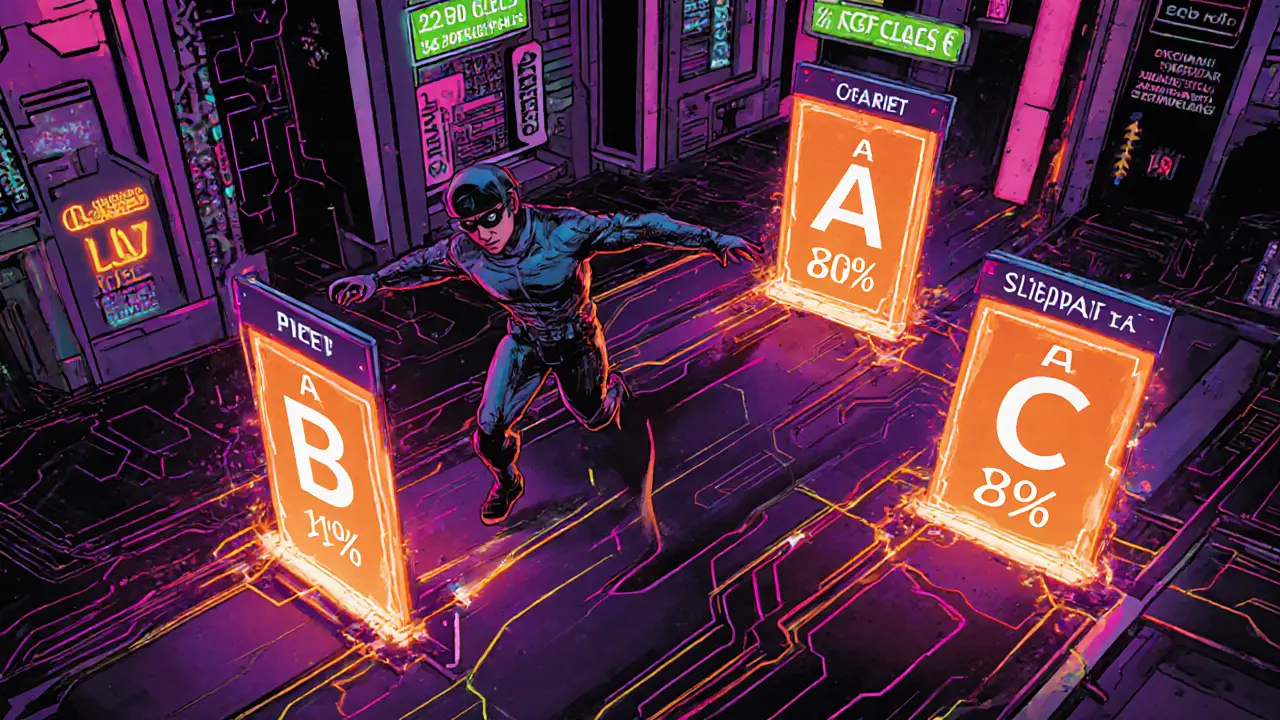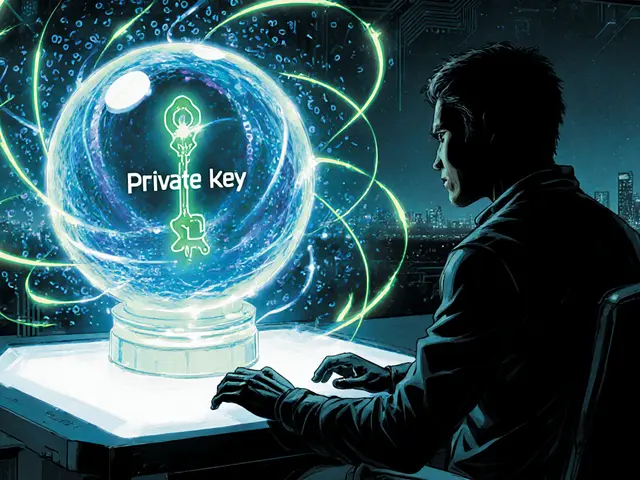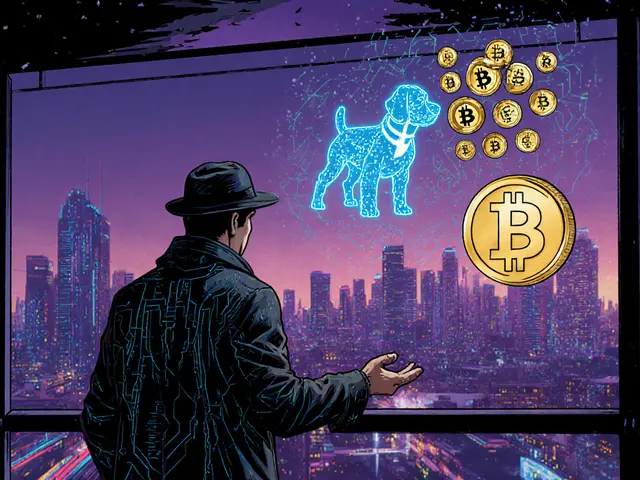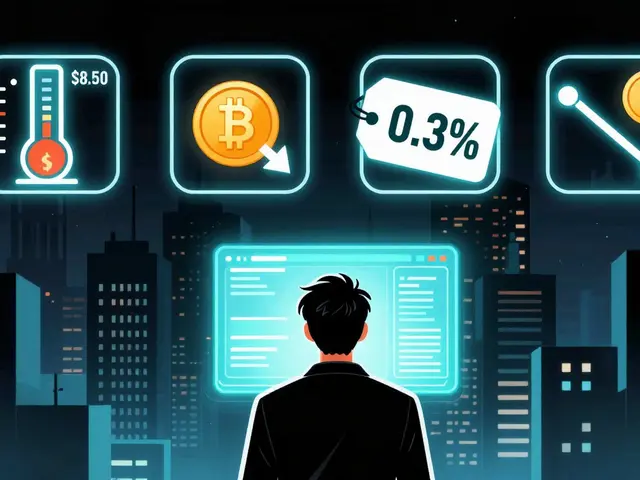NeptuneX (NPTX) Explained: What Is This Crypto Coin?
NeptuneX (NPTX) Price & Supply Calculator
Total Supply
100,000,000 NPTX
Circulating Supply
~0 NPTX (reported as 0 on Binance)
Current Price (Binance)
$0.000137
Fully Diluted Market Cap
≈ $13,654
Your NPTX holding is worth approximately .
Based on current price of .
When you hear the name NeptuneX, you might wonder whether it’s just another meme token or something that actually moves the DeFi needle. In plain terms, NeptuneX is a decentralized exchange (DEX) aggregator that lives on the Blast blockchain and uses the ticker NPTX. It aims to give traders the fastest, cheapest swaps by pulling liquidity from dozens of DEXs, then routing the trade through the most efficient path.
TL;DR
- NeptuneX (NPTX) is a DEX aggregator on the Blast blockchain.
- Its Smart Order Routing scans multiple DEXs to find the best price and lowest slippage.
- Total supply is capped at 100million NPTX; circulating supply is currently negligible.
- Price data varies widely - around $0.00014 on Binance, with tiny 24‑hour volumes.
- Anonymous team, low market activity, but a technically interesting approach to trade efficiency.
What Is NeptuneX?
NeptuneX is a decentralized exchange aggregator built on the Blast blockchain. It consolidates liquidity from multiple DEXs, allowing users to swap tokens in a single click while the platform searches for the optimal route behind the scenes.
The native utility token, identified by the ticker NPTX, powers the ecosystem. Holding NPTX can grant access to future governance proposals, fee discounts, or incentive programs, although detailed tokenomics beyond the fixed total supply have not been publicly disclosed.
The Blast Blockchain Backbone
Blast blockchain is a high‑throughput, low‑fee layer‑1 network launched in 2023. Its design focuses on fast finality and cheap transaction costs, making it a suitable substrate for DeFi applications that need to execute many swaps per second. NeptuneX leverages Blast’s scalability to keep gas fees near‑zero compared with Ethereum‑based aggregators.
How the Smart Order Routing Works
Smart Order Routing (SOR) is the core algorithmic engine behind NeptuneX. The SOR scans a graph of connector tokens, evaluates non‑linear paths, and selects the route that delivers the best price after accounting for slippage and gas fees.
For example, swapping TokenA for TokenC could go directly (A→C) or through an intermediate token (A→B→C). The SOR calculates both options in real time, then executes the cheaper route. This approach mimics the “best price” logic you see on centralized exchanges, but does so on‑chain without relinquishing custody of funds.

Tokenomics at a Glance
| Metric | Value |
|---|---|
| Total supply | 100,000,000 NPTX |
| Circulating supply | ~0 (reported as 0 on Binance) |
| Current price (Binance) | $0.000137 |
| All‑time high (reported) | $1.50 (CoinCarp) / $0.010526 (Binance) |
| All‑time low (reported) | $0.0000422 (CoinCarp) / $0.000048 (Binance) |
| Fully diluted market cap | ≈ $13,654 (based on Binance price) |
The discrepancy between “circulating supply = 0” and the existence of a price reflects the fact that the token may be locked in smart contracts, used for staking, or simply not yet released to public wallets. Investors should treat the market‑cap numbers with caution.
Price Reality Across Exchanges
Price data for NPTX is scattered. Below is a snapshot from three major trackers (as of October12025):
| Platform | Price (USD) | 24‑hr change | 24‑hr volume (USD) |
|---|---|---|---|
| Binance | $0.000137 | -0.35% | $0 (reported) |
| CoinMarketCap | $0.000139 | +1.97% | $0.046,207 |
| CoinCarp | $0.0000852 (range low‑high) | n/a | n/a |
These gaps hint at low liquidity and limited exchange listings. Traders attempting sizable swaps may experience noticeable price impact.
How to Use NeptuneX
- Connect a compatible wallet (e.g., MetaMask, Trust Wallet) that supports the Blast network.
- Select the token you want to sell and the token you want to receive.
- Enter the amount and let the platform refresh the quote. The SOR will display the best route and estimated gas.
- Confirm the transaction. The swap happens on‑chain, and you retain custody of your assets at all times.
The UI is marketed as “user‑friendly,” but because the Blast ecosystem is still niche, users may need to bridge assets onto Blast first-a step that can be confusing for beginners.
Community, Transparency, and Risks
NeptuneX’s team and investors remain anonymous. While privacy can protect against targeted attacks, it also raises red flags for due‑diligence. The project’s official channels (Telegram, Discord) have modest membership and scarce technical updates.
Risk factors include:
- Very low trading volume - price can swing wildly on small orders.
- Limited exchange listings - withdrawing NPTX to a major exchange may be difficult.
- Smart contract exposure - as with any DEX aggregator, bugs in the routing logic could lead to loss.
- Lack of audited tokenomics - the token’s distribution and vesting schedules are unclear.
Potential upside lies in the innovative SOR engine and the promise of low‑fee trading on Blast, but investors should treat NPTX as a high‑risk, speculative asset.
Where NeptuneX Stands in the DEX Aggregator Landscape
Other well‑known aggregators-1inch, Paraswap, Matcha-operate on Ethereum, Polygon, and Binance Smart Chain. NeptuneX differentiates itself by building exclusively on Blast, aiming for sub‑second transaction finality and virtually free gas. However, the ecosystem’s modest size means the overall liquidity pool is far smaller than Ethereum‑based counterparts.
In short, if you value ultra‑low fees and are already active on Blast, NeptuneX could be a handy shortcut. If you’re looking for deep liquidity and a vibrant community, the more established aggregators still dominate.

Frequently Asked Questions
What blockchain does NeptuneX run on?
NeptuneX is built on the Blast blockchain, a high‑throughput layer‑1 network designed for low‑fee DeFi applications.
How does the Smart Order Routing improve my trades?
The SOR scans multiple DEXs and connector tokens, then automatically selects the path that offers the best price and least slippage, all while keeping gas costs to a minimum.
Is NPTX listed on major exchanges?
As of October2025, NPTX is primarily available on Binance’s over‑the‑counter listings and a handful of niche trackers. Liquidity is very low.
Can I keep my funds in my wallet while swapping?
Yes. Because NeptuneX executes swaps via smart contracts, you never hand over private keys. Your assets stay in your wallet until the transaction is confirmed.
What are the main risks of using NeptuneX?
Low liquidity can cause price swings, the team’s anonymity makes auditing difficult, and any bugs in the routing contracts could expose funds.






16 Comments
celester Johnson
January 30 2025We drift through a sea of token hype, chasing shadows that promise salvation while the abyss yawns beneath.
Prince Chaudhary
January 30 2025While the sentiment feels heavy, remember that every protocol starts as an idea, and the right tooling can turn theory into utility.
John Kinh
January 30 2025Looks like another meme hiding behind fancy graphics.
Somesh Nikam
January 30 2025Even if the hype feels thin, the underlying Smart Order Routing could still offer genuine slippage savings for traders who need fast, cheap swaps.
Jenae Lawler
January 30 2025One must concede that the allure of sub‑second settlement on a nascent layer‑1 is, at best, a marginal advantage when the liquidity pool remains infinitesimal.
Chad Fraser
January 30 2025That's a fair point; for newcomers, the real win is the near‑zero gas costs, which can make the platform feel more welcoming despite the limited depth.
Jayne McCann
January 31 2025Probably not worth the risk.
Richard Herman
January 31 2025Risk is inherent in emerging ecosystems, yet dismissing them outright may overlook opportunities for early adopters to shape governance and benefit from future incentives.
Parker Dixon
January 31 2025NeptuneX’s concept of aggregating DEX liquidity on Blast is technically sound and aligns with the broader DeFi trend of minimizing friction.
The Smart Order Routing engine, in particular, can shave off a few basis points compared to a single‑hop swap on a crowded chain.
However, the practical impact hinges on the actual depth of liquidity across the connected DEXs, which appears rather sparse at the moment.
With a reported circulating supply of essentially zero, the token’s market cap calculations are more theoretical than reflective of real trading activity.
That said, the low‑fee environment of Blast does give NeptuneX a niche where high‑frequency arbitrage bots could thrive.
Users must still bridge assets onto Blast, which adds a layer of complexity and potentially discourages casual traders.
The anonymity of the development team raises legitimate security concerns, as code audits become harder to verify without clear accountability.
From a governance perspective, holding NPTX might eventually grant voting rights, but the roadmap for such features remains vague.
In comparison to established aggregators like 1inch, the liquidity pool size is orders of magnitude smaller, limiting large trade execution.
On the flip side, the near‑zero gas fees could make micro‑transactions economically viable, something that Ethereum‑based aggregators struggle with.
The token’s price volatility is extreme, with historical swings that could either reward speculative traders or wipe out hesitant investors.
Community engagement seems modest, with limited updates on Discord and Telegram, which might affect long‑term sustainability.
For developers, the open‑source nature of the SOR algorithm could inspire forks or integrations into other Blast projects.
Ultimately, the project sits at an intersection of promising technology and high speculative risk.
Investors should perform diligent on‑chain analysis before allocating capital, focusing on contract interactions and actual swap volumes.
In short, NeptuneX offers a technically intriguing DEX aggregator, but its success will depend on liquidity growth, transparent governance, and community adoption.
Nathan Blades
January 31 2025Indeed, the engineering behind the routing is impressive, and if the community rallies, we could see those liquidity gaps shrink dramatically.
katie littlewood
January 31 2025The colorfully crafted architecture could become a playground for DeFi artisans, especially if tokenomics are clarified and incentives are rolled out with fanfare. A vibrant ecosystem thrives on clear signals, not just cryptic whispers. Should the team unveil a transparent vesting schedule, I can envision a cascade of liquidity inflows that transform the current whispers into a robust chorus.
Stefano Benny
January 31 2025From a protocol stack perspective, the marginal gas optimization on Blast does not compensate for the sub‑optimal order book depth, rendering the APR calculations essentially moot.
Bobby Ferew
January 31 2025It's disheartening to watch another project get lost in buzzwords while real utility remains elusive.
Mark Camden
January 31 2025One must underscore that promoting a token with negligible trading volume borders on misinformation, especially when the team remains faceless.
Evie View
January 31 2025Enough with the moralizing; the market will decide, not your lecturing.
Sidharth Praveen
January 31 2025Let's stay constructive-if the platform improves its liquidity, even skeptical observers might give it a chance.